BladeRoom Enters US Market
BladeRoom Introduces New Generation of Modular Data Centers to the US Market The British company has teamed up with Modular Power Solutions to create the BladeRoom branch in America, which will enable the production of prefabricated structural elements at a Michigan factory. This, in turn, will allow the organization of the construction of modular data centers on customer sites throughout the United States. In January 2014, the company opened a technology center in Chicago to present its projects.
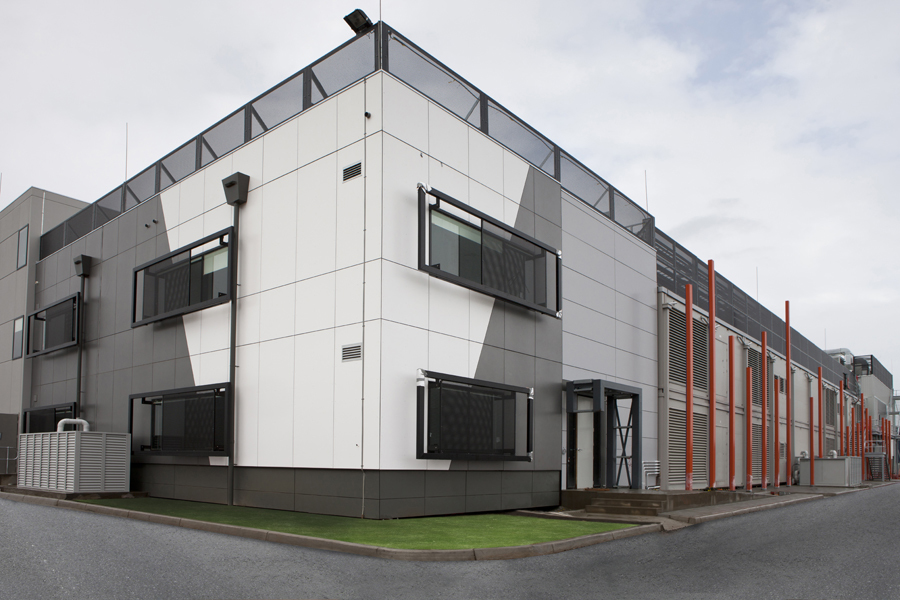
In Europe, Asia and Africa, BladeRoom has built more than 30 data centers using projects that can be completed in less than 20 weeks. Among them is Merlin, the data center of CapGemini in the UK, one of the most powerful in the world. BladeRoom reports that such projects using free cooling can give a PUE score of 1.09 - 1.17.

A company with 20 years of experience has come to this business in its own special way. Initially, BladeRoom was engaged in the construction of modular commercial kitchens, including for the Olympic Games, which required knowledge in the field of thermal energy management. Also, more than 150 modular operating rooms for hospitals and technically complex facilities were built that required high-quality filtration and air ventilation to ensure sterility. In 2008, the company was renamed BladeRoom and switched to the construction of modular data centers.
“We started with a not-so-confident position — building kitchens and operating rooms,” says Barnaby Smith, Head of PR at BladeRoom USA. “We turned the data center into separate engineering parts. Using them, you can create objects of any size and power. ”
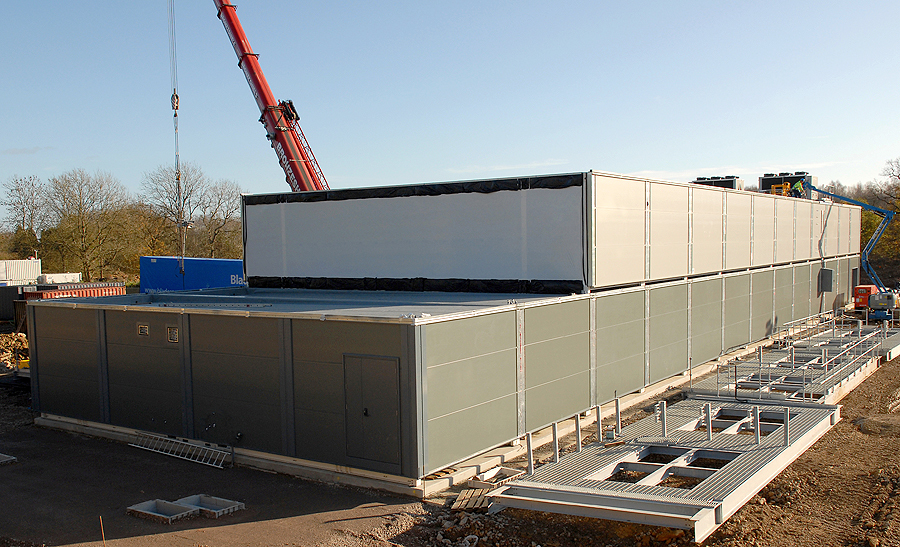
Despite a fairly modest start, BladeRoom has serious plans to conquer the US market. “BladeRoom is making progress on the data center construction market in the United States as we are the only ones to produce prefabricated structures according to your individual requirement, while maintaining the flexibility and reliability of traditional data centers, ”says Smith.“ Our facilities are put into operation faster and cost much less than standard data centers due to higher energy efficiency. ”

Modular Power Solutions (MPS) is part of Rosendin Holding (the founder of Rosendin Electric) and has already provided more than 60 MW of modular capacity to its customers, including Digital Realty Trust and Bank of America. The experience of MPS / Rosendin in modular structures was the perfect complement to BladeRoom's experience in IT construction. “We always followed the US market,” said Smith. “Last year we contacted Rosendin. They became interested in our system. ”
BladeRoom is now at the forefront among companies developing the production of structural elements for the construction of modular data centers, similar to traditional stone construction. Other companies also offer similar next-generation projects, including IO, Datapod, Colt, and AST Modular. But BladeRoom does not see them as competitors.
“The competition in this area that we have seen mainly includes standard solutions and data centers with specific sizes. This is significantly different from what BladeRoom does. We compete with those who choose traditional, unchanging data centers. Sometimes, of course, we enter the competition with modular projects, but mainly focus on traditional ones. ”
BladeRoom is a neutral IT provider that offers any solutions for the location of cabinets and racks, and is able to provide projects of any size and capacity - from 70 kW to 1.5 MW. The halls optimized for air cooling have an average power of 1 to 20 kW per cabinet, with immediate delivery of cabinets up to 50 kW.
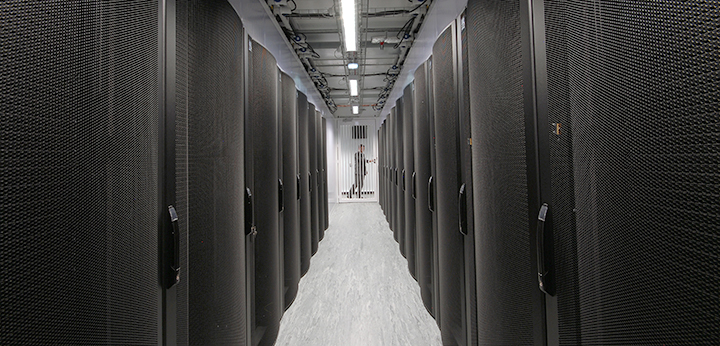
The cooling system is designed so that the air flow uses the least amount of energy and water needed. BladeRoom has a multi-chamber Air Optimizer cooling system that filters fresh air and cools it using evaporative cooling. The DX system is used as a backup for periods when the outside temperature does not support free cooling. This system allows you to cool the air that is supplied to the premises, due to direct contact of the air flows with the evaporators of the cooling system. Each BladeRoom includes management software that automatically adjusts air cooling when IT activities in the machine rooms change. The system supports different densities for data rooms within the same facility. The design does not use raised floors or air ducts. “Here is our secret ingredient,” says Smith.
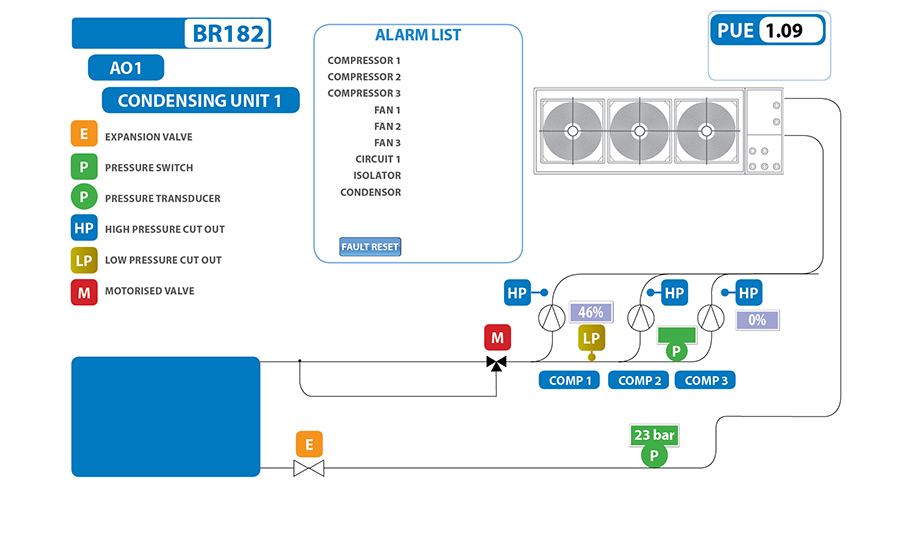
Rosendin / MPS draws on its knowledge and manufacturing experience for a variety of climate zones across all states. “The US is a special market,” says Smith. “He has completely different requirements across the country. There cannot be a universal approach. Because our system is flexible enough to adapt to the needs of customers in any state. ”
There are solutions for earthquake-prone zones, wind-resistant structures for regions where hurricanes and tornadoes are a real problem. A significant advantage of BladeRoom that directly affects sales is the involvement of a relatively small number of people in the construction of structures. “One of the advantages of our approach is the accurate calculation of materials and processes,” says Smith. “This allows us to compete in many dimensions.”
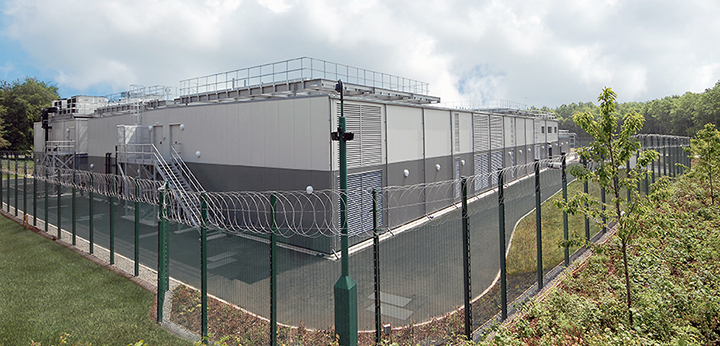
In international business, BladeRoom notes a strong merger of collocation and wholesale (wholesale) companies, including Metronode (Australia), Megatron Federal (South Africa) and Ark Continuity (UK). The same situation can be established in the USA, where service providers were looking for an opportunity to outsource the construction of their facilities. The advantage of this approach is now taking advantage of Compass Datacenters, using prefabricated structures and building data centers for Windstream, Savvis / CenturyLink and Iron Mountain.

In Europe, Asia and Africa, BladeRoom has built more than 30 data centers using projects that can be completed in less than 20 weeks. Among them is Merlin, the data center of CapGemini in the UK, one of the most powerful in the world. BladeRoom reports that such projects using free cooling can give a PUE score of 1.09 - 1.17.

A company with 20 years of experience has come to this business in its own special way. Initially, BladeRoom was engaged in the construction of modular commercial kitchens, including for the Olympic Games, which required knowledge in the field of thermal energy management. Also, more than 150 modular operating rooms for hospitals and technically complex facilities were built that required high-quality filtration and air ventilation to ensure sterility. In 2008, the company was renamed BladeRoom and switched to the construction of modular data centers.
Weak Origins - Global Ambition
“We started with a not-so-confident position — building kitchens and operating rooms,” says Barnaby Smith, Head of PR at BladeRoom USA. “We turned the data center into separate engineering parts. Using them, you can create objects of any size and power. ”

Despite a fairly modest start, BladeRoom has serious plans to conquer the US market. “BladeRoom is making progress on the data center construction market in the United States as we are the only ones to produce prefabricated structures according to your individual requirement, while maintaining the flexibility and reliability of traditional data centers, ”says Smith.“ Our facilities are put into operation faster and cost much less than standard data centers due to higher energy efficiency. ”

Modular Power Solutions (MPS) is part of Rosendin Holding (the founder of Rosendin Electric) and has already provided more than 60 MW of modular capacity to its customers, including Digital Realty Trust and Bank of America. The experience of MPS / Rosendin in modular structures was the perfect complement to BladeRoom's experience in IT construction. “We always followed the US market,” said Smith. “Last year we contacted Rosendin. They became interested in our system. ”
Flexibility in modular design
BladeRoom is now at the forefront among companies developing the production of structural elements for the construction of modular data centers, similar to traditional stone construction. Other companies also offer similar next-generation projects, including IO, Datapod, Colt, and AST Modular. But BladeRoom does not see them as competitors.
“The competition in this area that we have seen mainly includes standard solutions and data centers with specific sizes. This is significantly different from what BladeRoom does. We compete with those who choose traditional, unchanging data centers. Sometimes, of course, we enter the competition with modular projects, but mainly focus on traditional ones. ”
BladeRoom is a neutral IT provider that offers any solutions for the location of cabinets and racks, and is able to provide projects of any size and capacity - from 70 kW to 1.5 MW. The halls optimized for air cooling have an average power of 1 to 20 kW per cabinet, with immediate delivery of cabinets up to 50 kW.

The cooling system is designed so that the air flow uses the least amount of energy and water needed. BladeRoom has a multi-chamber Air Optimizer cooling system that filters fresh air and cools it using evaporative cooling. The DX system is used as a backup for periods when the outside temperature does not support free cooling. This system allows you to cool the air that is supplied to the premises, due to direct contact of the air flows with the evaporators of the cooling system. Each BladeRoom includes management software that automatically adjusts air cooling when IT activities in the machine rooms change. The system supports different densities for data rooms within the same facility. The design does not use raised floors or air ducts. “Here is our secret ingredient,” says Smith.

More diverse requirements in the USA
Rosendin / MPS draws on its knowledge and manufacturing experience for a variety of climate zones across all states. “The US is a special market,” says Smith. “He has completely different requirements across the country. There cannot be a universal approach. Because our system is flexible enough to adapt to the needs of customers in any state. ”
There are solutions for earthquake-prone zones, wind-resistant structures for regions where hurricanes and tornadoes are a real problem. A significant advantage of BladeRoom that directly affects sales is the involvement of a relatively small number of people in the construction of structures. “One of the advantages of our approach is the accurate calculation of materials and processes,” says Smith. “This allows us to compete in many dimensions.”

In international business, BladeRoom notes a strong merger of collocation and wholesale (wholesale) companies, including Metronode (Australia), Megatron Federal (South Africa) and Ark Continuity (UK). The same situation can be established in the USA, where service providers were looking for an opportunity to outsource the construction of their facilities. The advantage of this approach is now taking advantage of Compass Datacenters, using prefabricated structures and building data centers for Windstream, Savvis / CenturyLink and Iron Mountain.
